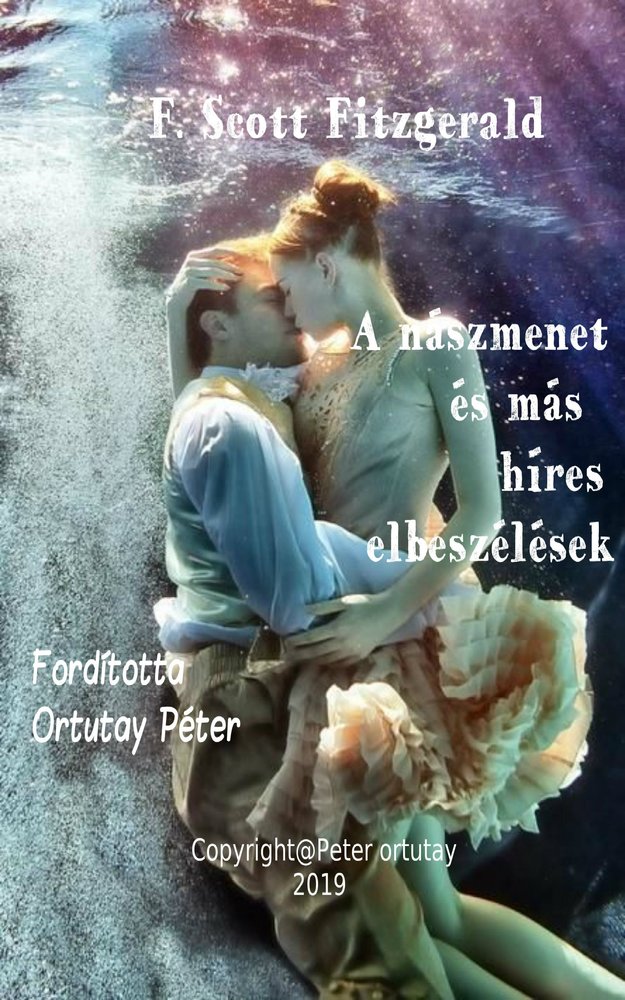A művész dicsÅsége
Szóljon a jazzband -
bingó-bangó!
Táncolunk majd
és búg a tangó;
Csattan a taps; de
szép a lányka!
TündöklÅ új
a fiú ruhája...
Meg kellett halnia, hogy újra kezdhesse elrontott életét. Közönsége már eltemette, gyászbeszéd és méltatások nélkül: erkölcsi hullaként kezelték. Keresztülnéztek rajta, amint letűnt idÅk divatjamúlt szellemeként botladozott közöttük alkoholtól ködös szemmel, félszeg, bocsánatkérÅ mosollyal. Eszméletlen tivornyákból sodródott a józanság partjai felé: fogadkozott, hogy dolgozni fog, nem iszik többé. Még részegen is fáradhatatlanul működött ironikus zöld szemének minden jelentÅs mozzanatot felvevÅ filmforgató gépe; agyában párbeszédek és dallamok rögzÅdtek. A született író csalhatatlan érzékével élményeit az idÅ szűrÅje nélkül is azonnal jelképpé oldotta fel. Alkoholtól reszketÅ kezével keresgélte nem alkuvó szigorúsággal az élménydarabkák legmegfelelÅbb helyét a színes és művészi igazságú mozaikban, melyen élete utolsó évében dolgozott. Végül nem is ivott - csakhogy már késÅ volt. Szíve már nem adott haladékot, hogy befejezhesse dédelgetett, igényes regényét, Az utolsó cézárt. A végsÅ szívroham 1940 decemberében végzett vele. Érzelmi, erkölcsi, anyagi csÅdtömegnek tekintette magát: még tehetségemmel se tudtam sáfárkodni - mondta keserűen. Pazarolta magát, és ellobogott, mint a két végén meggyújtott fáklya. Mi maradt belÅle?
Kortársai úgy könyvelték el Francis Scott Fitzgeraldot, mint a húszas évek új nemzedékének képviselÅjét, a dzsesszkorszak elÅfutárát, névadóját és termékét - semmi mást. MerÅben új típusok jelentkeztek már elsÅ írásaiban is: a felsÅ középosztály elkényeztetett fiai és lányai, a koraérett, fanyar, cinikus flapperek és egyetemi arany ifjak. MeglehetÅsen meglepÅdött, amikor kissé wertheri világfájdalmú, de modern impresszionista stílusú és felépítésű regényébÅl az olvasók a flappert emelték ki, pedig Å egy érzékeny lelkű, tehetséges fiú jellemnevelÅ iskoláját, botlásait és önmagára-találását kívánta bemutatni. De a sikerbÅl azonnal megértette, hogy öntudatlanul a korszak pulzusára tapintott, s most már átvette New York szívdobbanásának ütemét. A nagy példányszámú The Saturday Evening Post számára gyártja a flapper történeteket egyre emelkedÅ tiszteletdíjért. A Kalóz a szigeten (Offshore Pirate), Veronika bubifrizurája (Bernice Bobs Her Hair), A népszerű lány (The Popular Girl) legemlékezetesebb sikerű elbeszélései. Novellásköteteinek a címével is az igényekhez alkalmazkodik: Flapperek és filozófusok, A dzsesszkorszak meséi - ki tudott volna ellenállni ilyen csábító címeknek? TÅkésíti a flappert, és majdnem élete végéig, a dzsesszkorszak bukása után is visszatérÅ témái: A Szerelemhajó (Love Boat), A vonzerÅ (Magnetism), Jacob létrája (Jacob´s Ladder), De a maga korában (At your Age), Josephine múltja (A Woman With a Past).
Fitzgerald az évekig tartó, egyetlen mámoros estély forgatagában is mindenkinél elÅbb érezte meg a közeledÅ vihart, a leselkedÅ végzetet. Élte, látta, megírta és intette a kort. Újra címekkel: Azok a szomorú fiatalok (All the Sad Young Men) a novelláskötetének címe, és az új regényéé: Szépek és átkozottak (The beautiful and the Damned). De akkor még a valóság arányai eltorzultak: Még a hó sem volt valódi a húszas években. Ha azt akartuk, hogy ne legyen hó, csak fizetnünk kellett. Kölcsönkapott idÅ volt mindenképpen: a felsÅ tízezer a nagyhercegek gondtalanságával és a kóristalányok léhaságával ütötte agyon az idÅt. Akkora bÅségben forgott a dollár, hogy nem aggódtak, ha pillanatnyilag elfogyott a pénzük. Lehetetlennek látszott, hogy másnapra ne szerezzenek. De mire a húszas évek lángja ellobogott, Fitzgeraldban is kihunyt az ifjúság. Befelé fordult, s mint a vak, aki a többi érzékszervét fejleszti az elveszett szeme világa pótlására, Å is új értékeket keresgélt az elveszettek vagy elvetettek helyébe - és magyarázatot a bukásra. S a gazdasági válság pillanatnyi kijózanodásában sokan hazasietnek Amerikába: Fitzgeraldék is visszatérnek (részben Zelda betegsége miatt). Hajójuk New York felé közeledik, és az Elveszet városom-ban (My Lost City) Scott felidézi, mit jelentett számára valaha New York. Amikor a város vasbeton, üveg- és acélrengetege magába szippantotta a fiatal írót, Fitzgerald ámult a frissen épült Woolworth áruház rózsaszínű, égbe nyúló tornyán, és üvölteni szeretett volna a boldogságtól: tudta, hogy mindent megkapott, és ilyen boldog nem lesz többé soha. A válság alatt New York (és Amerika) varázsa elveszett: kihalt és komor, mint egy romváros. Az Empire State Building tetejérÅl nézegeti a várost, és megérti a titkot, melyet a gondtalan években sohasem gyanítottak. New York (és Amerika) nem az egész világmindenség, mint hitték: határai vannak minden irányban, lehetÅségei nem korlátlanok.
Írói művészete magaslatára Fitzgerald 29 éves korában érkezett A nagy Gatsby-vel, 1925-ben. Megjelenése után 15 évvel ismerte fel, hogy többi regényének a megírásával egy percre sem lett volna szabad ellankadnia. Mert a tékozló évtized után, a harmincas évekre már nemcsak a világról tűntek el illúziói, hanem önmagáról is. Emberi nagyságot már nem várt el magától - tudta, hogy roncs. Az új évtizednek nem lehet példaképe, csak intÅ példája, de az talán még lehet. Valódi énje keresése közben rombolta addigi képmásait, a hamis értékeket: így hullt el Basil Duke Lee, Amory Blaine, Anthony Patch, Dick Diver. Férfikora botlásait könyörtelen ítélettel tárta fel írásai egész sora. Az alkoholbeteg (An Alcoholic Case), Az elfuserált évtized (The Lost Decade) és Finnegan finanszírozása (Financing Finnegan) a józan Fitzgerald borzadását mutatja, élete mélypontjára tekintve. Félt, hogy még rosszabb is következhet: önmaga számára figyelmeztetÅül írta Hollywoodban az elaljasult Pat Hobbyról szóló történeteket. Nem szabad, hogy valaha idáig süllyedjen.
A húszas évek ifjú nemzedéke vállára vette, a negyvenes évek kritikusai tanulmányköteteket és cikkek százait írták munkáiról, az ötvenes évek diákjai kötelezÅ olvasmányként vizsgáztak műveibÅl középiskolákban és egyetemeken. (Manapság újabb, sokadik reneszánszát éli az USA-ban és szerte a világon - Magyarországon sajnos nem. Minden sorát, szavát, gondolatát elemzik, kommentálják. MűveibÅl divat PhD és nagydoktori disszertációkat írni. - A szerk. megj.).
Egy évtizeddel halála után Stephen Vincent Benét világosan látta maradandóságát: Nos, uraim, most már levehetik kalapjukat. Ez már nem egy élet legendája - ez a művész dicsÅsége; s azt hiszem, nem tévedek: századunk egyik legbiztosabban megalapozott hírneve Fitzgerald.


